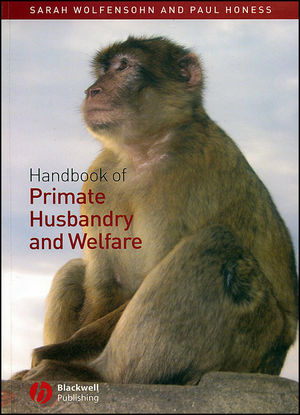Handbook of Primate Husbandry and WelfareISBN: 978-1-4051-1158-4
Paperback
180 pages
February 2005, Wiley-Blackwell
 This is a Print-on-Demand title. It will be printed specifically to fill your order. Please allow an additional 10-15 days delivery time. The book is not returnable.
|
||||||
Acknowledgements.
1 Primates: Their characteristics and relationship with man.
What is a primate?
Primate characteristics.
Why are primates special?
Ethical considerations of animals in captivity.
Legal considerations.
Further reading.
2 The physical environment.
Considerations in accommodation design.
Indoor/outdoor/combination facilities.
Environmental conditions.
Waste management.
Further research needed.
Further reading.
3 Staff, management and health and safety.
Selection of staff.
Training of staff.
Health and safety issues.
Lone working.
Employee security.
Further reading.
4 Nutrition.
Natural feeding ecology.
Diet formulation and processing.
Energy requirements.
Carbohydrate, protein and fat.
Minerals and vitamins.
Water.
Supplements.
Different life stages.
Hand rearing of infants.
Further reading.
5 Physical well-being.
Assessment of physical health.
Quarantine programme.
Health-screening programme.
Common infectious diseases.
Husbandry-related diseases.
Sedation of primates.
Further reading.
6 Psychological well-being.
Strategy for psychological well-being.
Environmental enrichment.
Assessment of psychological health.
Further reading.
7 Training of primates.
Why train primates?
Sociality and psychological well-being in primates.
Primate behaviour.
Modification of behaviour.
Further reading.
8 Breeding.
Group systems and sizes.
Primate fertility.
Natural suppression of fertility.
Reproductive cycles.
Artificial control of reproduction.
Pregnancy diagnosis.
Parturition.
Lactation and weaning.
Breeding lifespan.
Selection of breeding males.
Further reading.
9 Sourcing and transporting primates.
Background.
Transportation.
Provision during transport.
Post-move monitoring.
Further reading.
Index.



